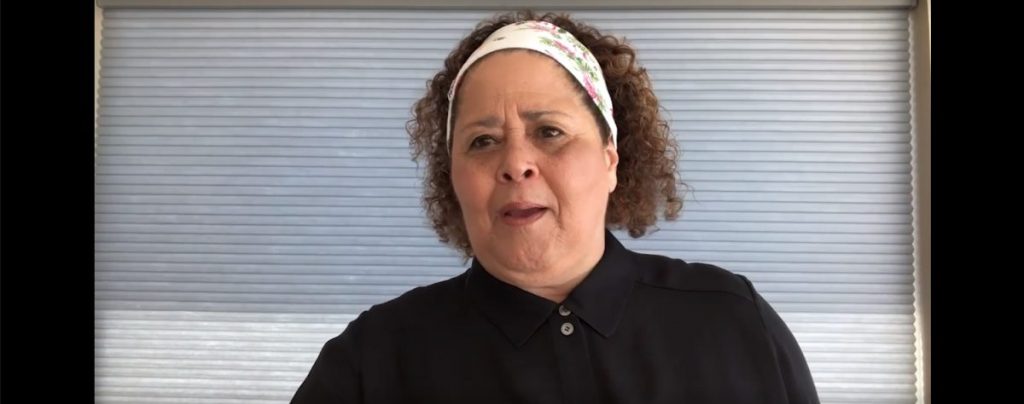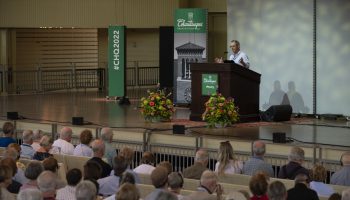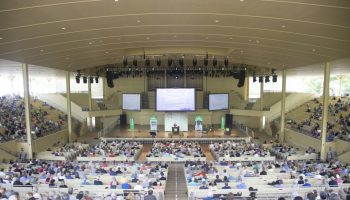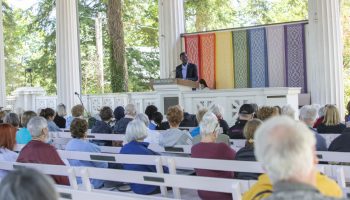
Anna Deavere Smith grew up in Baltimore in de facto segregation — legislation did not overtly segregate students by race, but school segregation continued. Her grandfather told her “if you say a word often enough, it becomes you.”
That sentiment stuck with her and, over the past few decades, Smith has traveled around the United States, interviewing thousands of people about different topics.
“I’ve been trying to become America, word-for-word, and in some ways I’m doing that to defy de facto segregation, to defy the idea that I can’t go here, I can’t go there, I belong here but not there, that I can only care about me and mine,” Smith said.
Smith is the founding director of the Institute on the Arts and Civic Dialogue, now housed at New York University, and is the recipient of the National Humanities Medal and two Tony nominations, and in 2015 was named the Jefferson Lecturer by the National Endowment for the Humanities. She is also the recipient of the Dorothy and Lillian Gish Prize, a Guggenheim Fellowship, and most recently, the 2017 Ridenhour Courage Prize and the George Polk Career Award for authentic journalism. She has written more than 15 one-woman plays, using her portrayals of her interviewees to shine a light on the different emotions and views of controversial topics. She talked on Monday, July 13, on the CHQ Assembly, delivering her unique brand of performative lecture for the Chautauqua Lecture Series titled “Community, Character, Diversity” as part of Week Three’s theme of “Art and Democracy.”
Smith first performed an interview from the Rev. James Cohn, who she interviewed for her play Let Me Down Easy.
During this interview, Cohn had talked about how most “Black love songs, blues and jazz is a transmutation about injustice, too.”
“But it’s covert, not overt,” Smith performed as Cohn. “And it’s a combination of talking about love and talking about hurt from broken love, broken-heartedness, and at the same time talking about what’s happening to you in society.”
Cohn said people need something, whether it is social or personal, to sustain themselves in harsh times.
“There’s something within that you can’t always explain; there’s something within you, that’s a kind of affirmation of you,” said Smith as she embodied Cohn, “that allows you to know who you are and to be at ease with who you are, at peace with who you are, no matter what’s happening around you. And no matter what you’re gonna face.”
Smith said that the themes in Cohn’s interview would resonate throughout the presentation, especially love.
“Most rebellion, protest, or this reckoning that we’re in now, is filled with love. … Think about all the love songs about broken love,” Smith said. “And isn’t it funny so many of us fall in love to those songs almost, you know, in anticipation of when it’s all going to go away?”
The next interview was with Kevin Moore, who in 2015 filmed Baltimore Police beating Freddie Gray, who died in police custody.
Moore had said that he was awakened by the screaming. He put clothes on and he went outside.
“They had him all bent up. He was handcuffed, like facedown on his stomach, but they had, like the heels of his feet, almost in his back,” Smith quoted Moore.
“They had the knee in the neck, that pretty much explains the three cracked vertebrae, the crushed larynx and 80 percent of the spinal cord being severed,” Smith recited.
Moore filmed with his phone, and when he zoomed in, he could see the pain on Gray’s face. The officers then put leg shackles on Gray and had him walk to the police vehicle.
“The camera is the only thing that we have to protect ourselves that is not illegal, you know, but at the same time, you know, in the same sense, these guys could feel threatened. ‘Oh well. Yeah, I mistook his camera for a gun,’” Smith performed.
Moore had never filmed before, but he knew people had to see what happened to Gray. He called every news outlet he could, like the New York Times. People from Ferguson, Missouri, supported him, spent the night at his house and bought him four cameras, “basically arming me.”
Smith also interviewed more than 320 people in Los Angeles after Rodney King’s beating by police. She could not find a song that was sung during the protests, unlike the music that came out of the Civil Rights Movement in the ‘60s. Smith asked Jesse Norman, a famous singer, “Why do you suppose there were no anthems in the Los Angeles riots?”
“Black people have a great tradition of singing ourselves through troubles,” Smith performed as Norman. “I mean, this is how the spiritual came into being. That in order to deal with this unbelievable situation of having been transported from one’s homeland and being made a slave, we had to sing ourselves through. … We didn’t take ourselves out of it. We sang ourselves through it.”
But Norman also said that if she were a young person, and she felt she was being heard for the first time, “It wouldn’t be singing, as we know it.”
“It would be a roar. Oh, I think it would be a roar. Oh, it would come. Oh, it would come from the bottom of my feet,” Smith enacted. “I really think it would be like a lion. Just roaring. It wouldn’t be singing, as we know it. It wouldn’t be words. It would just be like the Earth’s first offering.”
The next interview was from Rep. John Lewis (D-GA). Every year, Lewis went to Selma to commemorate the anniversary of Bloody Sunday. In 2013, he stopped by Montgomery and stopped at the First Baptist Church. A young police chief came on behalf of the mayor, who was not available. The chief apologized to Lewis for when Montgomery police did not protect him from an angry mob during the Freedom Rides, and indeed beat Lewis themselves.
That was the first time Lewis received an apology from a police chief of a city where he was beaten or arrested.
“He said, ‘To show the respect that I have for you and for the movement, I want to take off my badge and give it to you.” And this church was so quiet. No one said a word,” Smith said, performing as Lewis. “And I stood up … and I started crying, and everybody in the church started crying. There was not a dry eye in the church.”
Lewis said he himself was not worthy of taking the officer’s badge. The chief said he could get another one and told Lewis again to take his badge. Lewis took it, and they hugged.
“I cried some more. You had Democrats and Republicans in a church crying. And this young Black officer was sitting down. He couldn’t stand,” Smith said as Lewis. “He cried so much so much, like a baby really.”
Smith then quoted Martin Luther King, Jr.: “We were out to redeem the soul of America. We first had to redeem ourselves.”
“This message, this act of grace, a badge, says to me: Hold on, never give up, never lose faith, keep the faith,” Smith said.
The lecture then shifted to a Q-and-A session with Matt Ewalt, Vice President and Emily and Richard Smucker Chair for Education. Ewalt asked if enough Americans were asking, “What can I do?”
Smith said she has heard many people asking what they can do after George Floyd’s murder and in the midst of the pandemic.
“I think it’s interesting to juxtapose our behavior as Americans in this global pandemic with the unrest, and the moment of reckoning, because they both present an opportunity to just think about the person across from you in the simplest way, or in a bigger way,” Smith said.
Ewalt then asked how people could become better listeners.
Smith said she listens for utterances, not for words.
“Don’t try to get to where someone’s going too quickly, but be willing to stick with utterances, and what you’ll hear is that many people don’t finish their sentence, they don’t get successfully to the end of a sentence without making utterances, other than words,” Smith said.
She also said that she does not think “of my listening as necessarily being morally good.” Too many people, she said, are not present in the moment while they listen. Smith was moved by a speech from a doctor in which he described his work.
“Every single time he walks into the room to meet a new patient, it is such an exciting experience because it doesn’t matter whether it’s a street sweeper, another physician, a scientist, you know, a debutante,” Smith said. “He has something in common with them: mortality, and humaneness. And that’s the interaction he’s about to have. And to me, that’s a real healer.”




